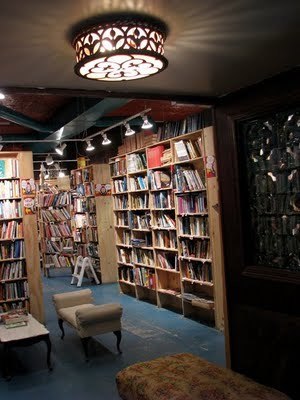Ariel Gordon's Blog, page 79
June 29, 2011
Keillor has good ear for overview of American poetry
Winnipeg Free Press - PRINT EDITION
Reviewed by: Ariel Gordon
GOOD Poems: American Places (Viking, 484 pages, $36) is a poetry anthology edited by writer/radio host Garrison Keillor.
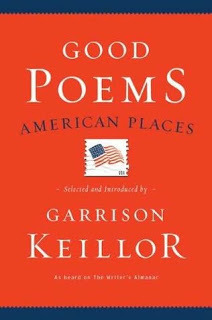 Like his previous anthologies Good Poems and Good Poems for Hard Times, it contains poems selected for - and read aloud on - Keillor's NPR show The Writer's Almanac.
Like his previous anthologies Good Poems and Good Poems for Hard Times, it contains poems selected for - and read aloud on - Keillor's NPR show The Writer's Almanac.
Though Keillor declares himself "strongly biased towards the high-spirited and jazzy voice" and poems that are "straightforward, declarative, in plain English," he still manages section heads that include: The Place Where We Were Naked and 2X2X2 in addition to the more straightforward On the Road and City Life.
If you don't buy the populist conceit - given that the great majority of the writers included in Good Poems: American Places are poet/profs - then another possible framing mechanism is "poems by contemporary American lyric poets." Particular favourites of Keillor's, going by the number of poems he included from each poet, include Rexroth, Stafford and Kumin.
Organizational quibbles aside, Keillor has a good ear. His anthologies are a good place to start for anyone wanting a quick and dirty, lovely and lilting overview of American poetry.
* * *
Speaking of contemporary lyric poets, Sue Goyette has made quite a name for herself since The True Names of Birds appeared in 1998.
In addition to being nominated for the Governor General's Award for Poetry and both the Pat Lowther and Gerald Lampert Awards, Goyette's debut is now in its seventh printing.
Her third outing, Outskirts (Brick Books, 112 pages, $19), represents a departure for the Halifax poet. Prose poems and long sequences prevail where in her previous books Goyette favoured poems a page or two in length.
Goyette has also italicized the poems here with only the odd proper noun or bit of dialogue in regular typeface. The effect is that of a writer speaking from the sidelines, as if she regrets her previous pronouncements.
"There was a secret / level to all of this but I hadn't collected enough feathers to get into it," she notes in her poem Memoir.
But perhaps the sotto voce is useful for a poet who is also the mother of teenagers, who is using the language of government and reports to write about the loss of darkness in our fluorescent cities, of privacy and time and the poisoned sea.
* * *
Raised in Dauphin but based in Vancouver, Rachel Thompson won the First Book Competition at the Writer's Studio at Simon Fraser University.
The result is Galaxy (Anvil Press, 96 pages, $16), a coming-of-age collection full of memorable strikes of pleasure and pain, as in her Coriander:
"Your kiss hello is a bee sting. / Both of us would rather you hit me / to complete the violence / of your gesture."
Galaxy is a book of extremes: the poems rocket between childhood / adulthood, rural / urban and desire / love. And although Thompson traffics in strong images and abrupt juxtapositions, she also allows room for doubt and ambivalence.
Which is to say: Very nice! (More poems, please!)
* * *
Ken Babstock's fourth collection, Methodist Hatchet (Anansi, 102 pages, $23) is brimming with allusions, with dry wit and the precise language with which Babstock delivers his precise images, as in his As Marginalia in John Clare's The Rural Muse:
"The wall-mounted paper dispenser // narrating nightmares of scale, sores fell / from fingers - get well petals - and grew // back puce."
The Toronto-based poet and editor's three previous collections have been nominated for every award under the sun and the poems in Methodist Hatchet are likewise dazzling and dizzying.
They're poems you attempt to follow because you trust the poet to deliver you somewhere unexpected and yet familiar, even if you get snarled in the pop culture and canonical shrubberies to either side of the path.
Ariel Gordon is a Winnipeg writer.
Reviewed by: Ariel Gordon
GOOD Poems: American Places (Viking, 484 pages, $36) is a poetry anthology edited by writer/radio host Garrison Keillor.
 Like his previous anthologies Good Poems and Good Poems for Hard Times, it contains poems selected for - and read aloud on - Keillor's NPR show The Writer's Almanac.
Like his previous anthologies Good Poems and Good Poems for Hard Times, it contains poems selected for - and read aloud on - Keillor's NPR show The Writer's Almanac.Though Keillor declares himself "strongly biased towards the high-spirited and jazzy voice" and poems that are "straightforward, declarative, in plain English," he still manages section heads that include: The Place Where We Were Naked and 2X2X2 in addition to the more straightforward On the Road and City Life.
If you don't buy the populist conceit - given that the great majority of the writers included in Good Poems: American Places are poet/profs - then another possible framing mechanism is "poems by contemporary American lyric poets." Particular favourites of Keillor's, going by the number of poems he included from each poet, include Rexroth, Stafford and Kumin.
Organizational quibbles aside, Keillor has a good ear. His anthologies are a good place to start for anyone wanting a quick and dirty, lovely and lilting overview of American poetry.
* * *
Speaking of contemporary lyric poets, Sue Goyette has made quite a name for herself since The True Names of Birds appeared in 1998.
In addition to being nominated for the Governor General's Award for Poetry and both the Pat Lowther and Gerald Lampert Awards, Goyette's debut is now in its seventh printing.
Her third outing, Outskirts (Brick Books, 112 pages, $19), represents a departure for the Halifax poet. Prose poems and long sequences prevail where in her previous books Goyette favoured poems a page or two in length.
Goyette has also italicized the poems here with only the odd proper noun or bit of dialogue in regular typeface. The effect is that of a writer speaking from the sidelines, as if she regrets her previous pronouncements.
"There was a secret / level to all of this but I hadn't collected enough feathers to get into it," she notes in her poem Memoir.
But perhaps the sotto voce is useful for a poet who is also the mother of teenagers, who is using the language of government and reports to write about the loss of darkness in our fluorescent cities, of privacy and time and the poisoned sea.
* * *
Raised in Dauphin but based in Vancouver, Rachel Thompson won the First Book Competition at the Writer's Studio at Simon Fraser University.
The result is Galaxy (Anvil Press, 96 pages, $16), a coming-of-age collection full of memorable strikes of pleasure and pain, as in her Coriander:
"Your kiss hello is a bee sting. / Both of us would rather you hit me / to complete the violence / of your gesture."
Galaxy is a book of extremes: the poems rocket between childhood / adulthood, rural / urban and desire / love. And although Thompson traffics in strong images and abrupt juxtapositions, she also allows room for doubt and ambivalence.
Which is to say: Very nice! (More poems, please!)
* * *
Ken Babstock's fourth collection, Methodist Hatchet (Anansi, 102 pages, $23) is brimming with allusions, with dry wit and the precise language with which Babstock delivers his precise images, as in his As Marginalia in John Clare's The Rural Muse:
"The wall-mounted paper dispenser // narrating nightmares of scale, sores fell / from fingers - get well petals - and grew // back puce."
The Toronto-based poet and editor's three previous collections have been nominated for every award under the sun and the poems in Methodist Hatchet are likewise dazzling and dizzying.
They're poems you attempt to follow because you trust the poet to deliver you somewhere unexpected and yet familiar, even if you get snarled in the pop culture and canonical shrubberies to either side of the path.
Ariel Gordon is a Winnipeg writer.
Published on June 29, 2011 12:16
June 28, 2011
And one more...
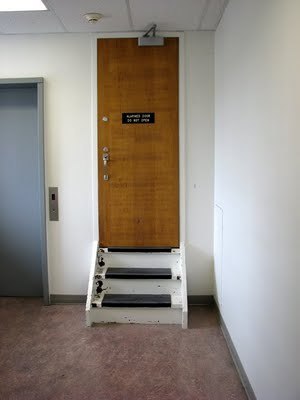
* * *
I'm not sure where this door leads. I suspect out to the expanse of rooftop out my windows. But I WILL find out.
Published on June 28, 2011 20:49
First day

* * *
So I've been working at the U of M Press for two weeks now.
The is the view out of my door that includes the St. John's College Library, whose focus is, at least in part, Canadian literature.
Which makes it a VERY friendly neighbour...
Beyond that, one wall of my office is windows; it's light and I can work away the whole day without talking to more than a handful of people.
It's precious and twee but also true: I'm entering the job a manuscript/web page at a time.
Published on June 28, 2011 20:08
June 27, 2011
Reprint: The Mother 'Hood
So Canadian Bookshelf is a new lit website. It's brand new, so new as to be beta. (Is 'beta' the new 'site under construction' or 'store open during renovations'?)
But they're already doing recommended reading lists. And having guest list-ers and people coming up with themed lists.
And this week, Hump was included in a list called The Mother 'Hood, which is "Canadian books that explore the mothering experience - the good and the bad."
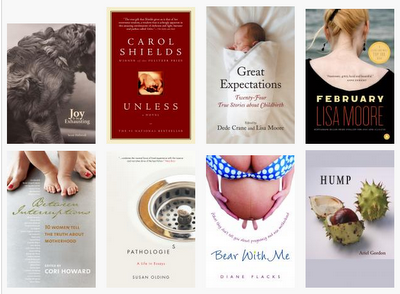
My thoughts, fleeting and sparse after a busy Monday day/night are: "What a good list!" and "I can't wait to see what the list-er thinks of Hump!" and "I MUST FINALLY read Pathologies..."
I've reviewed a fair number of 'mothering' anthologies over the last few years (see my review for Great Expectations here) and in addition to the ones listed here, I'd also add a recommendation for Double Lives: Writing and Motherhood.
Yay! (Mothering) fun!
But they're already doing recommended reading lists. And having guest list-ers and people coming up with themed lists.
And this week, Hump was included in a list called The Mother 'Hood, which is "Canadian books that explore the mothering experience - the good and the bad."

My thoughts, fleeting and sparse after a busy Monday day/night are: "What a good list!" and "I can't wait to see what the list-er thinks of Hump!" and "I MUST FINALLY read Pathologies..."
I've reviewed a fair number of 'mothering' anthologies over the last few years (see my review for Great Expectations here) and in addition to the ones listed here, I'd also add a recommendation for Double Lives: Writing and Motherhood.
Yay! (Mothering) fun!
Published on June 27, 2011 21:02
June 22, 2011
Robert Kroetsch: 1927-2011
I heard today that Robert Kroetsch died in a car accident.
I never studied with him, though I tried to talk my way into Kroetsch's Novel Colloquium at Sage Hill when I was in my mid-twenties.
It didn't work: Steven Ross Smith was polite but it was clear to both of us that I didn't have the credits or the experience.
 Another time, I wrote him an earnest letter, asking if he'd be willing to apply to the MWG's Emerging Writer Mentorship Program as a mentor and then, maybe, pick my submission.
Another time, I wrote him an earnest letter, asking if he'd be willing to apply to the MWG's Emerging Writer Mentorship Program as a mentor and then, maybe, pick my submission.
But he was just on the cusp of retirement and wrote back to say that couldn't take on another responsibility.
A year and a half ago, when I got the (dreaded) author questionnaire that preceded Hump's publication and had to think about who "would speak for my work," it took me a very long time to come up with a shortlist.
But Kroetsch was the first name on that list.
I mean, I'd lived inside his writing for so many years: The Studhorse Man. The Puppeteer. Badlands. Seed Catalogue, and, most recently, his Too Bad: Sketches Towards a Self-Portrait.
And he had been so friendly and gracious during his years in Winnipeg, teaching at the University of Manitoba.
So I tentatively contacted Kroetsch. And it took him less than a week after my ms. made its way to Leduc, Alberta, where he was living, to get back to me with this:
"Ariel Gordon is superbly, supremely, a poet of the body. She finds words for the physicality of the forest, of the garden, of pregnancy. Hump speaks the erotics of being alive and being in love with being alive." – Robert Kroetsch.
And then I found out that my publisher dislikes blurbs, so it wouldn't be going on the back cover. And then I found out that he'd also blurbed several friends with new books, including Jonathan Ball and Tracy Hamon.
But I didn't care one whit. Because even the idea of Robert Kroetsch, ROBERT KROETSCH, reading my poetry, was enough to make me weep. And twenty years from now, that'll be all that matters.
What I'll remember most was my last exchange with Robert, back in February.
I'd been thinking about Robert of late, how I should send him and email and tell him again how honoured I was to have him read my work.
Robert died yesterday in a car accident on the way home from a reading in Canmore. And I'm just so sad, even though he was 84 and had lived a good long life and was still writing.
My condolences go out to Kroetsch's family, to his many friends and colleagues but, mostly, to his readers.
Here's to you, Robert. Thanks again for everygoddamnthing.
I never studied with him, though I tried to talk my way into Kroetsch's Novel Colloquium at Sage Hill when I was in my mid-twenties.
It didn't work: Steven Ross Smith was polite but it was clear to both of us that I didn't have the credits or the experience.
 Another time, I wrote him an earnest letter, asking if he'd be willing to apply to the MWG's Emerging Writer Mentorship Program as a mentor and then, maybe, pick my submission.
Another time, I wrote him an earnest letter, asking if he'd be willing to apply to the MWG's Emerging Writer Mentorship Program as a mentor and then, maybe, pick my submission. But he was just on the cusp of retirement and wrote back to say that couldn't take on another responsibility.
A year and a half ago, when I got the (dreaded) author questionnaire that preceded Hump's publication and had to think about who "would speak for my work," it took me a very long time to come up with a shortlist.
But Kroetsch was the first name on that list.
I mean, I'd lived inside his writing for so many years: The Studhorse Man. The Puppeteer. Badlands. Seed Catalogue, and, most recently, his Too Bad: Sketches Towards a Self-Portrait.
And he had been so friendly and gracious during his years in Winnipeg, teaching at the University of Manitoba.
So I tentatively contacted Kroetsch. And it took him less than a week after my ms. made its way to Leduc, Alberta, where he was living, to get back to me with this:
"Ariel Gordon is superbly, supremely, a poet of the body. She finds words for the physicality of the forest, of the garden, of pregnancy. Hump speaks the erotics of being alive and being in love with being alive." – Robert Kroetsch.
And then I found out that my publisher dislikes blurbs, so it wouldn't be going on the back cover. And then I found out that he'd also blurbed several friends with new books, including Jonathan Ball and Tracy Hamon.
But I didn't care one whit. Because even the idea of Robert Kroetsch, ROBERT KROETSCH, reading my poetry, was enough to make me weep. And twenty years from now, that'll be all that matters.
What I'll remember most was my last exchange with Robert, back in February.
Dear Ariel,And I could somehow see him as he was writing this email, the light, his hands on the keys, and it made me so very happy.
I reread your poems this grey Alberta winter morning and marveled once again at your ability to translate the experience of our senses into sensual language. What a gift!
Robert
I'd been thinking about Robert of late, how I should send him and email and tell him again how honoured I was to have him read my work.
Robert died yesterday in a car accident on the way home from a reading in Canmore. And I'm just so sad, even though he was 84 and had lived a good long life and was still writing.
My condolences go out to Kroetsch's family, to his many friends and colleagues but, mostly, to his readers.
Here's to you, Robert. Thanks again for everygoddamnthing.
Published on June 22, 2011 10:38
June 19, 2011
Out-of-Town-Authors: Dale Barbour
Life's just beachyFormer Winnipegger taking Winnipeg Beach tales to Gimli on TuesdayWinnipeg Free Press - PRINT EDITIONby: Ariel GordonUsually, people refer to the thick books they lug to the cottage as "beach reads."
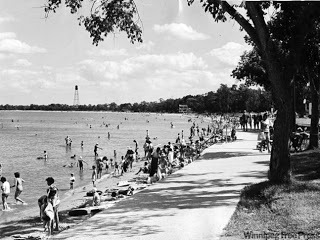 Dale Barbour has got it backwards. He wrote a slim book about the beach entitled Winnipeg Beach: Leisure and Courtship in a Resort Town, 1900-1967.Barbour will be importing Winnipeg Beach to Gimli (or, for those who were following, lugging the slim book about the beach to another beach) on Tuesday.He'll be reading with Patti Grayson and Sheila McClarty at an event hosted by Tergesen's General Merchant at the Aspire Theatre.* * *1) As a writer (i.e. someone whose artistic practice is predicated on time spent alone) how do you approach performance? What do you get out of it?Traditionally I've approached it with a feeling of raw terror and impending doom. But I'm starting to relax a little. I try to select a reading that can stand on its own and catch the attention of listeners who haven't read the book. Ideally, I'll get some good questions or comments. That's critical in a history project like mine where the people I'm reading to have often lived through at least part of the period I'm studying. They can learn from my research, I can learn from their experience.2) What do you want people to know about Winnipeg Beach: Leisure and Courtship in a Resort Town, 1900-1967?If you went to Winnipeg Beach in your youth, this should bring back a lot of memories. It's a cultural history and that means I'm focused on how people lived, worked and played at the beach in the first half of the 20th century. But even if you've never been to Winnipeg Beach, this book is a window into how relations between men and women have changed over time and how Manitoba's cultural mosaic has changed. I like to say that form follows function, and when it comes to Winnipeg Beach, the resort was very much a creature of the gender and ethnic relations of the early 20th century. As those relations changed, so too did the resort.3) Will this be your first time in Winnipeg? What have you heard?I've been in Toronto working on my PhD for the past two years. But previous to that I lived in Winnipeg for about eight years; Winnipeg Beach was researched and written while I was working and studying at the University of Manitoba. Plus I grew up in the south Interlake - Balmoral - a half-hour north of the perimeter. So, for me Winnipeg has always just been "the city."4) What are you reading right now? What are you writing right now?I just wrapped up Toronto: A City Becoming, edited by David Macfarlane and then I'm on to Toronto: The Place of Meeting by Frederick H. Armstrong. You can see the trend. I'm just starting to research my thesis, which is going to focus on Toronto, so for the next little while I'm going to be doing a lot more reading than writing. I did come up for air the other week and read World War Z: An Oral History of the Zombie War by Max Brooks because one should always be prepared for a zombie apocalypse.5) What do you think Winnipeg Beach would have been like, at its height?It would have been as much a part of Winnipeg as Portage and Main. The Canadian Pacific Rail link ensured that people could flow back and forth between the city and the beach and one of Manitoba's first provincial highways headed straight to Winnipeg Beach. It was the place where families set up for their vacation at a time when having a vacation was still a novelty, where workplaces came for a picnic and where men and women came to play together. On busy weekends, it drew 40,000 people when Winnipeg's population was only around 250,000 or 300,000.Ariel Gordon is a Winnipeg writer.
Dale Barbour has got it backwards. He wrote a slim book about the beach entitled Winnipeg Beach: Leisure and Courtship in a Resort Town, 1900-1967.Barbour will be importing Winnipeg Beach to Gimli (or, for those who were following, lugging the slim book about the beach to another beach) on Tuesday.He'll be reading with Patti Grayson and Sheila McClarty at an event hosted by Tergesen's General Merchant at the Aspire Theatre.* * *1) As a writer (i.e. someone whose artistic practice is predicated on time spent alone) how do you approach performance? What do you get out of it?Traditionally I've approached it with a feeling of raw terror and impending doom. But I'm starting to relax a little. I try to select a reading that can stand on its own and catch the attention of listeners who haven't read the book. Ideally, I'll get some good questions or comments. That's critical in a history project like mine where the people I'm reading to have often lived through at least part of the period I'm studying. They can learn from my research, I can learn from their experience.2) What do you want people to know about Winnipeg Beach: Leisure and Courtship in a Resort Town, 1900-1967?If you went to Winnipeg Beach in your youth, this should bring back a lot of memories. It's a cultural history and that means I'm focused on how people lived, worked and played at the beach in the first half of the 20th century. But even if you've never been to Winnipeg Beach, this book is a window into how relations between men and women have changed over time and how Manitoba's cultural mosaic has changed. I like to say that form follows function, and when it comes to Winnipeg Beach, the resort was very much a creature of the gender and ethnic relations of the early 20th century. As those relations changed, so too did the resort.3) Will this be your first time in Winnipeg? What have you heard?I've been in Toronto working on my PhD for the past two years. But previous to that I lived in Winnipeg for about eight years; Winnipeg Beach was researched and written while I was working and studying at the University of Manitoba. Plus I grew up in the south Interlake - Balmoral - a half-hour north of the perimeter. So, for me Winnipeg has always just been "the city."4) What are you reading right now? What are you writing right now?I just wrapped up Toronto: A City Becoming, edited by David Macfarlane and then I'm on to Toronto: The Place of Meeting by Frederick H. Armstrong. You can see the trend. I'm just starting to research my thesis, which is going to focus on Toronto, so for the next little while I'm going to be doing a lot more reading than writing. I did come up for air the other week and read World War Z: An Oral History of the Zombie War by Max Brooks because one should always be prepared for a zombie apocalypse.5) What do you think Winnipeg Beach would have been like, at its height?It would have been as much a part of Winnipeg as Portage and Main. The Canadian Pacific Rail link ensured that people could flow back and forth between the city and the beach and one of Manitoba's first provincial highways headed straight to Winnipeg Beach. It was the place where families set up for their vacation at a time when having a vacation was still a novelty, where workplaces came for a picnic and where men and women came to play together. On busy weekends, it drew 40,000 people when Winnipeg's population was only around 250,000 or 300,000.Ariel Gordon is a Winnipeg writer.
 Dale Barbour has got it backwards. He wrote a slim book about the beach entitled Winnipeg Beach: Leisure and Courtship in a Resort Town, 1900-1967.Barbour will be importing Winnipeg Beach to Gimli (or, for those who were following, lugging the slim book about the beach to another beach) on Tuesday.He'll be reading with Patti Grayson and Sheila McClarty at an event hosted by Tergesen's General Merchant at the Aspire Theatre.* * *1) As a writer (i.e. someone whose artistic practice is predicated on time spent alone) how do you approach performance? What do you get out of it?Traditionally I've approached it with a feeling of raw terror and impending doom. But I'm starting to relax a little. I try to select a reading that can stand on its own and catch the attention of listeners who haven't read the book. Ideally, I'll get some good questions or comments. That's critical in a history project like mine where the people I'm reading to have often lived through at least part of the period I'm studying. They can learn from my research, I can learn from their experience.2) What do you want people to know about Winnipeg Beach: Leisure and Courtship in a Resort Town, 1900-1967?If you went to Winnipeg Beach in your youth, this should bring back a lot of memories. It's a cultural history and that means I'm focused on how people lived, worked and played at the beach in the first half of the 20th century. But even if you've never been to Winnipeg Beach, this book is a window into how relations between men and women have changed over time and how Manitoba's cultural mosaic has changed. I like to say that form follows function, and when it comes to Winnipeg Beach, the resort was very much a creature of the gender and ethnic relations of the early 20th century. As those relations changed, so too did the resort.3) Will this be your first time in Winnipeg? What have you heard?I've been in Toronto working on my PhD for the past two years. But previous to that I lived in Winnipeg for about eight years; Winnipeg Beach was researched and written while I was working and studying at the University of Manitoba. Plus I grew up in the south Interlake - Balmoral - a half-hour north of the perimeter. So, for me Winnipeg has always just been "the city."4) What are you reading right now? What are you writing right now?I just wrapped up Toronto: A City Becoming, edited by David Macfarlane and then I'm on to Toronto: The Place of Meeting by Frederick H. Armstrong. You can see the trend. I'm just starting to research my thesis, which is going to focus on Toronto, so for the next little while I'm going to be doing a lot more reading than writing. I did come up for air the other week and read World War Z: An Oral History of the Zombie War by Max Brooks because one should always be prepared for a zombie apocalypse.5) What do you think Winnipeg Beach would have been like, at its height?It would have been as much a part of Winnipeg as Portage and Main. The Canadian Pacific Rail link ensured that people could flow back and forth between the city and the beach and one of Manitoba's first provincial highways headed straight to Winnipeg Beach. It was the place where families set up for their vacation at a time when having a vacation was still a novelty, where workplaces came for a picnic and where men and women came to play together. On busy weekends, it drew 40,000 people when Winnipeg's population was only around 250,000 or 300,000.Ariel Gordon is a Winnipeg writer.
Dale Barbour has got it backwards. He wrote a slim book about the beach entitled Winnipeg Beach: Leisure and Courtship in a Resort Town, 1900-1967.Barbour will be importing Winnipeg Beach to Gimli (or, for those who were following, lugging the slim book about the beach to another beach) on Tuesday.He'll be reading with Patti Grayson and Sheila McClarty at an event hosted by Tergesen's General Merchant at the Aspire Theatre.* * *1) As a writer (i.e. someone whose artistic practice is predicated on time spent alone) how do you approach performance? What do you get out of it?Traditionally I've approached it with a feeling of raw terror and impending doom. But I'm starting to relax a little. I try to select a reading that can stand on its own and catch the attention of listeners who haven't read the book. Ideally, I'll get some good questions or comments. That's critical in a history project like mine where the people I'm reading to have often lived through at least part of the period I'm studying. They can learn from my research, I can learn from their experience.2) What do you want people to know about Winnipeg Beach: Leisure and Courtship in a Resort Town, 1900-1967?If you went to Winnipeg Beach in your youth, this should bring back a lot of memories. It's a cultural history and that means I'm focused on how people lived, worked and played at the beach in the first half of the 20th century. But even if you've never been to Winnipeg Beach, this book is a window into how relations between men and women have changed over time and how Manitoba's cultural mosaic has changed. I like to say that form follows function, and when it comes to Winnipeg Beach, the resort was very much a creature of the gender and ethnic relations of the early 20th century. As those relations changed, so too did the resort.3) Will this be your first time in Winnipeg? What have you heard?I've been in Toronto working on my PhD for the past two years. But previous to that I lived in Winnipeg for about eight years; Winnipeg Beach was researched and written while I was working and studying at the University of Manitoba. Plus I grew up in the south Interlake - Balmoral - a half-hour north of the perimeter. So, for me Winnipeg has always just been "the city."4) What are you reading right now? What are you writing right now?I just wrapped up Toronto: A City Becoming, edited by David Macfarlane and then I'm on to Toronto: The Place of Meeting by Frederick H. Armstrong. You can see the trend. I'm just starting to research my thesis, which is going to focus on Toronto, so for the next little while I'm going to be doing a lot more reading than writing. I did come up for air the other week and read World War Z: An Oral History of the Zombie War by Max Brooks because one should always be prepared for a zombie apocalypse.5) What do you think Winnipeg Beach would have been like, at its height?It would have been as much a part of Winnipeg as Portage and Main. The Canadian Pacific Rail link ensured that people could flow back and forth between the city and the beach and one of Manitoba's first provincial highways headed straight to Winnipeg Beach. It was the place where families set up for their vacation at a time when having a vacation was still a novelty, where workplaces came for a picnic and where men and women came to play together. On busy weekends, it drew 40,000 people when Winnipeg's population was only around 250,000 or 300,000.Ariel Gordon is a Winnipeg writer.
Published on June 19, 2011 19:32
June 18, 2011
deep affection

* * *
So this is the elm canopy that covers our house. It shades our deck, makes it bearable to sit out there mid-day, and drops seed, new leaves, and incandescent canker worms onto its slats.
It mottles & shushes & makes any number of shades of green.
It also houses heaps of birds, though so far no owls or merlins (I am trying very hard not to hold that against it.).
And suddenly, though I've had elms towering over me for most of my adult life, I've developed a deep affection for MY elm.
I recently learned that Winnipeg's elms - which make up the elm canopy that for me is what defines Winnipeg, at least physically - are all about a hundred years old, which is a dignified age for an elm.
We had an elm removed from our block this spring. And my elm has some bare branches, a few of which come to rest on the boulevard whenever there's a particularly stormy storm.
So here's hoping that my deep affection for the tree is at least as good of a safety measure as the tanglefoot bands that go up every year.
Published on June 18, 2011 14:05
June 15, 2011
Out-of-Town-Authors: Waubgeshig Rice
Written voice: Aboriginal author draws on traditional storytelling
Winnipeg Free Press - PRINT EDITION
by: Ariel Gordon
Waubgeshig Rice is an Ottawa-based broadcast journalist and writer, who grew up in Wasauksing First Nation and spent four years in Winnipeg.
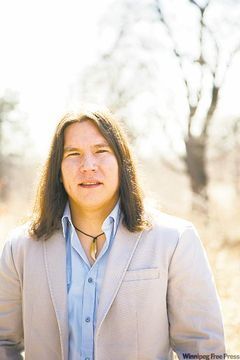 He will launch his first book of short stories — entitled Midnight Sweatlodge — next week.
He will launch his first book of short stories — entitled Midnight Sweatlodge — next week.
He'll be joined at Aqua Books on Wednesday by poets Rosanna Deerchild and Duncan Mercredi.
* * *
1) As a writer (i.e. someone whose artistic practice is predicated on time spent alone) how do you approach performance? What do you get out of it?
I think performance is an integral part of being a storyteller. I write as though I'm describing a scene or a story to someone face-to-face.
That's due in large part to the traditional Anishinaabe storytelling I grew up with. The stories and lessons my grandmother, aunts, uncles and other elders passed down to my generation were essentially performances. They had to engage us as kids and leave us with valuable teachings that we would carry with us and eventually pass down to our kids. I learned early on what it takes to convey the emotion and power in an ancient story, and although my writing isn't nearly as influential, I try to conduct my stories live the same way.
2) What do you want people to know about Midnight Sweatlodge?
I want people to know that the stories in Midnight Sweatlodge are just a small taste of what it's like to grow up as an aboriginal person in this country. It's essentially a short-story collection that touches on specific experiences and emotions, and although many of those are universal on reserves across Canada, there are thousands of more important stories in our communities.
3) Will this be your first time in Winnipeg? What have you heard?
I was fortunate enough to call Winnipeg home for four years as a reporter for CBC. I loved my time there (except the -30 C days) and I am thrilled beyond words to have the opportunity to come back and share my first published work of fiction.
4) What are you reading right now? What are you writing right now?
I just started reading Richard Wagamese's One Native Life. It's essentially about his life's journey. I've always looked up to his writing so as I begin this new journey as an author, I'm looking forward to learning a lot from this book. In my free time I'm working on my first full-length novel. Otherwise, my primary creative outlet is my blog — www.waub.ca.
5) How does your work as a journalist add to/distract from your creative writing?
It can be a big distraction. When you're working on deadline all day to make a story interesting and meaningful for viewers/readers, it leaves little left in the creative tank when you sit down at home to write. Broadcast writing and creative writing are very different — like the difference between swinging a baseball bat and a hockey stick — so the challenge is to draw parallels between the two formats and become a more well-rounded storyteller.
Even if I'm exhausted or worn out by the time I get home after a day out in the field and in the newsroom, I try to translate those experiences onto the laptop screen or into the notebook. From there, I can usually shift gears back to whatever creative project I'm working on.
Winnipeg Free Press - PRINT EDITION
by: Ariel Gordon
Waubgeshig Rice is an Ottawa-based broadcast journalist and writer, who grew up in Wasauksing First Nation and spent four years in Winnipeg.
 He will launch his first book of short stories — entitled Midnight Sweatlodge — next week.
He will launch his first book of short stories — entitled Midnight Sweatlodge — next week.He'll be joined at Aqua Books on Wednesday by poets Rosanna Deerchild and Duncan Mercredi.
* * *
1) As a writer (i.e. someone whose artistic practice is predicated on time spent alone) how do you approach performance? What do you get out of it?
I think performance is an integral part of being a storyteller. I write as though I'm describing a scene or a story to someone face-to-face.
That's due in large part to the traditional Anishinaabe storytelling I grew up with. The stories and lessons my grandmother, aunts, uncles and other elders passed down to my generation were essentially performances. They had to engage us as kids and leave us with valuable teachings that we would carry with us and eventually pass down to our kids. I learned early on what it takes to convey the emotion and power in an ancient story, and although my writing isn't nearly as influential, I try to conduct my stories live the same way.
2) What do you want people to know about Midnight Sweatlodge?
I want people to know that the stories in Midnight Sweatlodge are just a small taste of what it's like to grow up as an aboriginal person in this country. It's essentially a short-story collection that touches on specific experiences and emotions, and although many of those are universal on reserves across Canada, there are thousands of more important stories in our communities.
3) Will this be your first time in Winnipeg? What have you heard?
I was fortunate enough to call Winnipeg home for four years as a reporter for CBC. I loved my time there (except the -30 C days) and I am thrilled beyond words to have the opportunity to come back and share my first published work of fiction.
4) What are you reading right now? What are you writing right now?
I just started reading Richard Wagamese's One Native Life. It's essentially about his life's journey. I've always looked up to his writing so as I begin this new journey as an author, I'm looking forward to learning a lot from this book. In my free time I'm working on my first full-length novel. Otherwise, my primary creative outlet is my blog — www.waub.ca.
5) How does your work as a journalist add to/distract from your creative writing?
It can be a big distraction. When you're working on deadline all day to make a story interesting and meaningful for viewers/readers, it leaves little left in the creative tank when you sit down at home to write. Broadcast writing and creative writing are very different — like the difference between swinging a baseball bat and a hockey stick — so the challenge is to draw parallels between the two formats and become a more well-rounded storyteller.
Even if I'm exhausted or worn out by the time I get home after a day out in the field and in the newsroom, I try to translate those experiences onto the laptop screen or into the notebook. From there, I can usually shift gears back to whatever creative project I'm working on.
Published on June 15, 2011 11:42
June 11, 2011
And one more...
Published on June 11, 2011 11:11
Last day
So Wednesday was my last day at Aqua Books, what bookstore owner Kelly Hughes has dubbed Winnipeg's Cultural City Hall.
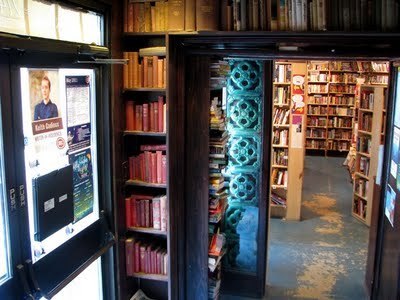 And this is the view from my desk at Aqua, where I schemed up events for three years.
And this is the view from my desk at Aqua, where I schemed up events for three years.
I'll miss the joint. I'll miss having the chance to chat with writers and musicians and actors and arts administrators about their events, to interact with readers and hand-sell my favourite titles.
(Frances Itani's Deafening. Colin Smith's 8X8X7. Jane Smiley's Moo. Kerry Ryan's The Sleeping Life. Timothy Findley's Famous Last Words. Joan Thomas' Reading By Lightning.
)
But it will be nice not to be administering within my own discipline, to not have to be constantly weighing and measuring how much of conflict of interest I was feeling at any one moment...
I'm also happy about my NEW job as Promotions/Editorial Assistant at the University of Manitoba Press.
I'm looking forward to the work but also how the OH SO INTERESTING topics they publish on (like social histories of the prairies, like literary criticism, like native studies) will influence my own work. Which is kind of a two-fer, if you get my drift...
Thanks for Kelly for the support over the years. For letting me swear in public. And for playing Hut 33 over the bookstore sound system when I needed it most:
Fergus: "Minka, you look very nice today."
Minka: "Correct."
 And this is the view from my desk at Aqua, where I schemed up events for three years.
And this is the view from my desk at Aqua, where I schemed up events for three years. I'll miss the joint. I'll miss having the chance to chat with writers and musicians and actors and arts administrators about their events, to interact with readers and hand-sell my favourite titles.
(Frances Itani's Deafening. Colin Smith's 8X8X7. Jane Smiley's Moo. Kerry Ryan's The Sleeping Life. Timothy Findley's Famous Last Words. Joan Thomas' Reading By Lightning.
)
But it will be nice not to be administering within my own discipline, to not have to be constantly weighing and measuring how much of conflict of interest I was feeling at any one moment...
I'm also happy about my NEW job as Promotions/Editorial Assistant at the University of Manitoba Press.
I'm looking forward to the work but also how the OH SO INTERESTING topics they publish on (like social histories of the prairies, like literary criticism, like native studies) will influence my own work. Which is kind of a two-fer, if you get my drift...
Thanks for Kelly for the support over the years. For letting me swear in public. And for playing Hut 33 over the bookstore sound system when I needed it most:
Fergus: "Minka, you look very nice today."
Minka: "Correct."
Published on June 11, 2011 10:17

